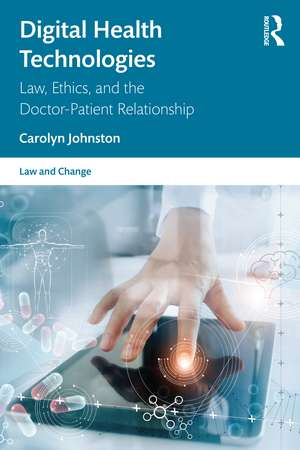Digital Health Technologies: Law, Ethics, and the Doctor-Patient Relationship: Law and Change
Autor Carolyn Johnstonen Limba Engleză Paperback – 30 dec 2022
A scene-setting case scenario at the start of each chapter describes the digital technology and identifies the sometimes competing interests of the key stakeholders. Broad themes of resource allocation, access to technologies, informed consent, privacy of health data and ethical concerns are considered in context, alongside analysis of legal duties owed by healthcare professionals to act in their patients’ best interests.
This book addresses legal and ethical issues arising from the use of emerging digital health technologies and is of interest to academics, clinicians and regulators and anyone interested in the development of health technologies and the challenges they may present. It focusses on the Australian legal framework, with some comparison to other jurisdictions.
| Toate formatele și edițiile | Preț | Express |
|---|---|---|
| Paperback (1) | 278.19 lei 3-5 săpt. | +11.39 lei 7-13 zile |
| Taylor & Francis – 30 dec 2022 | 278.19 lei 3-5 săpt. | +11.39 lei 7-13 zile |
| Hardback (1) | 898.57 lei 6-8 săpt. | |
| Taylor & Francis – 30 dec 2022 | 898.57 lei 6-8 săpt. |
Preț: 278.19 lei
Nou
Puncte Express: 417
Preț estimativ în valută:
53.23€ • 55.58$ • 44.06£
53.23€ • 55.58$ • 44.06£
Carte disponibilă
Livrare economică 14-28 martie
Livrare express 28 februarie-06 martie pentru 21.38 lei
Preluare comenzi: 021 569.72.76
Specificații
ISBN-13: 9781032115054
ISBN-10: 103211505X
Pagini: 170
Dimensiuni: 156 x 234 x 12 mm
Greutate: 0.16 kg
Ediția:1
Editura: Taylor & Francis
Colecția Routledge
Seria Law and Change
Locul publicării:Oxford, United Kingdom
ISBN-10: 103211505X
Pagini: 170
Dimensiuni: 156 x 234 x 12 mm
Greutate: 0.16 kg
Ediția:1
Editura: Taylor & Francis
Colecția Routledge
Seria Law and Change
Locul publicării:Oxford, United Kingdom
Public țintă
PostgraduateCuprins
1.Introduction 2. Digital genomic sequencing–who should have access to genomic information? 3. Internet of things and personalised medicine – ‘diy’ ing diabetes management 4. Smart phone apps for mental health 5. AI in diagnosis of health conditions 6. Symptom checker chatbots and informed consent 7. Telehealth –what has been learned through the covid-19 pandemic? 8. Robotic care assistants and older adults 9. A new use for existing technology - digital advance care decisions.
Recenzii
‘This book provides an excellent overview of the types of digital technologies that are being introduced into the clinic and the way that they are changing clinical practice. Using carefully selected case studies, the book analyses the complex ethical, legal and regulatory issues that are raised by implementing digital innovation. Carolyn Johnston is a lawyer who is well equipped to do this, having had many years working with clinicians and scientists who are navigating these issues. The threads that go through this book will provide readers with a rich understanding of these complex issues and generate insights into the way that clinical practice is changing.’
Jane Kaye, Professor of Health, Law and Policy and Director of the Centre for Health, Law and Emerging Technologies (HeLEX) at University of Oxford
‘Carolyn Johnston's book offers plain language insights into the complex and rapidly expanding world of digital health technologies. Consumers want the best, most convenient technologies to manage their health, yet clinicians may be wary of the traditional relationship power shifts and treatment efficacy concerns that result from the digital health care revolution.
Johnston explores eight new technologies and takes us back to the fundamentals of ethics, respect, humanity and evidence that should guide consumers, clinicians, regulators and society more broadly as this revolution unfolds. A timely scholarly contribution.’
Mark Cormack, Honorary Professor at the College of Health and Medicine, Australian National University (ANU)
Jane Kaye, Professor of Health, Law and Policy and Director of the Centre for Health, Law and Emerging Technologies (HeLEX) at University of Oxford
‘Carolyn Johnston's book offers plain language insights into the complex and rapidly expanding world of digital health technologies. Consumers want the best, most convenient technologies to manage their health, yet clinicians may be wary of the traditional relationship power shifts and treatment efficacy concerns that result from the digital health care revolution.
Johnston explores eight new technologies and takes us back to the fundamentals of ethics, respect, humanity and evidence that should guide consumers, clinicians, regulators and society more broadly as this revolution unfolds. A timely scholarly contribution.’
Mark Cormack, Honorary Professor at the College of Health and Medicine, Australian National University (ANU)
Notă biografică
Carolyn Johnston is a legal scholar and currently research fellow at the University of Tasmania, exploring legal and ethical obligations to provide raw genomic information to research participants. She was previously a member of the Centre for Health, Law and Emerging Technologies research team at the University of Melbourne and taught at Melbourne Law School. Carolyn is an experienced clinical ethicist and is chair of the Clinical Ethics Response Group at Monash Children’s Hospital, Melbourne, providing clinical ethics consultation.
Descriere
This book explores eight digital health technologies, situated the context of a life span, from high throughput genomic sequencing technologies and DIY insulin delivery for diabetes management in paediatrics, to the use of robotic care assistants for older adults and digital advance care decisions.


